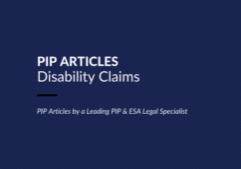Deciding Appeals in the Absence of Caimants
Can it ever be a good idea to have your appeal heard by a tribunal without attending? We don’t think so. We have represented clients at face-to-face hearings where the client has been unable or unwilling to attend, but family members came in place of the clients. I certainly remember attending with a client’s parents, with a sister and with a daughter and those appeals were allowed. We have also attended at least two hearings where no one could come; one was allowed but the tribunal adjourned the other as they were unhappy with having just the representative. That appeal lapsed because the DWP changed the decision and gave us the enhanced rate of both components.
A number of clients have come to us after opting to have their appeals heard without them but where the tribunals have thought that there was merit in the case and they have been reluctant to hear the case, because that would have meant dismissing the appeal. Instead, those tribunals adjourned and issued directions which encouraged the appellant to attend when the appeal was listed for an oral hearing. Think very seriously before you throw this opportunity away as the tribunal is doing its best to signal that you have a chance of winning but they need more information from you. You cannot use this as a way of gauging the strength of your appeal because tribunals are discouraged from adjourning on costs grounds so that most would not think twice about hearing and refusing your appeal, regardless of its potential.
Challenging a tribunal’s decision
If you are unhappy with a tribunal’s decision, either because your appeal was refused or it was allowed but only in part, the starting point is to request a statement of the tribunal’s reasons for their decision, and a copy of the ‘record of proceedings’. You have a calendar month in which to ask for these and that month begins on the day you were given or sent the written decision. These days, the record of proceedings is very likely to be the official recording of the hearing, rather than any note of the evidence that was made by the judge during the hearing. This is unfortunate as the hand written record would sometimes reveal an important misunderstanding on the part of the judge.
It is necessary to find one or more ‘errors of law’ in the statement of reasons and to ask in writing for ‘permission to appeal’ to the Upper Tribunal. You will not be given permission to appeal by arguing that the tribunal made the wrong decision, that they should have awarded more points or that a new piece of evidence would have made a difference if the tribunal had seen it. The focus now changes from these matters of fact to matters of law. It is outside the scope of this article to equip you to identify errors of law in the statement of reasons, but here is a list of the most common ones:
- The statement of reasons shows that the tribunal applied the wrong law, that it overlooked relevant case law or that it misunderstood the legislation.
- The tribunal made incorrect factual findings; it might have failed to make a necessary finding or took irrelevant facts into account.
- It gave inadequate reasons for its decision.
- The tribunal’s decision is not supported by the evidence, which could include ignoring or overlooking evidence, misinterpreting evidence or taking irrelevant evidence into account.
- The tribunal’s decision is perverse, meaning that it acted irrationally and in a manner that no reasonable tribunal could have acted, given the evidence before it and the findings of fact made. This option may look attractive but the bar is a high one and it will rarely apply.
- There has been a breach of the rules of natural justice, referring to a failure to follow procedure. This can be quite wide ranging but examples could include not allowing a party to the appeal to speak or evidence of bias.
I have seen an unrepresented appellant granted permission to appeal but I am in no doubt that an experienced and knowledgeable representative would do a better job. Worryingly, we have come across too many representatives who recommended that it was better not to try to challenge a tribunal’s decision, simply because they were unsure of how to go about it. We find that there is usually a material error of law to be found in a statement of reasons.
Your application for permission to appeal to the Upper Tribunal will be decided by a judge sitting alone and without a hearing. We find that at least half of our applications are refused by these judges. Do not be put off by this; you will be provided with an Upper Tribunal form UT1, on which to apply directly to the Upper Tribunal for permission to appeal and we find that the more knowledgeable judges there are very likely to agree with the exact same grounds that failed to impress the local judge.


 Now that’s what I call a PIP reconsideration request..
Now that’s what I call a PIP reconsideration request..